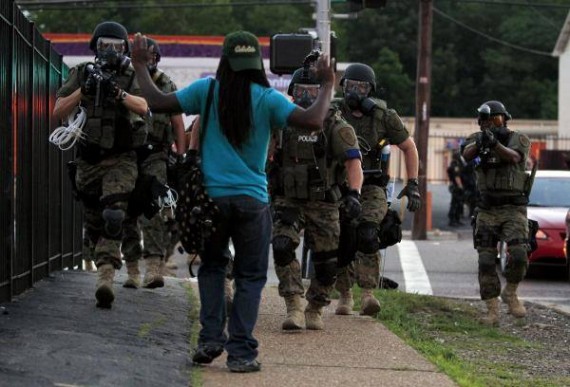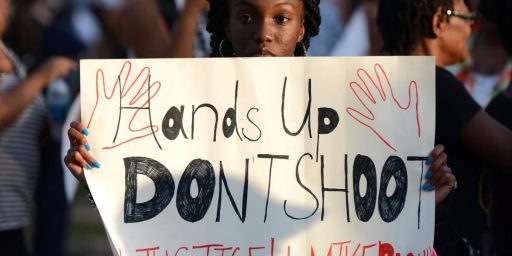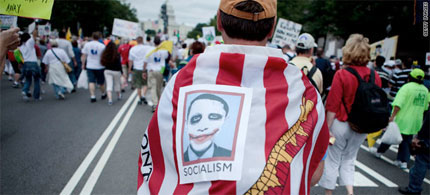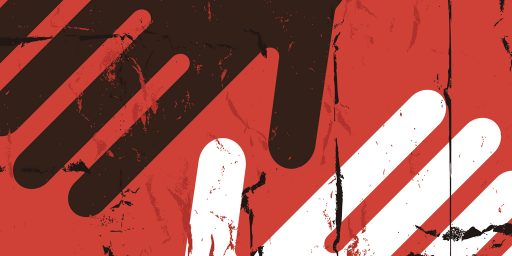Poll Find Wide Racial Divisions Over Confidence In Law Enforcement And The Justice System
Not surprisingly a new poll finds that African-Americans perceive the American justice system far differently than whites.
A new poll from NBC News and Marist College finds, not surprisingly, that there are deep racial divisions in the United States when it comes to perceptions of the relationship between the public and police forces and the criminal justice system in general: (emphasis mine)
Americans are deeply split along racial lines in their level of confidence that police officers will treat white and black people equally and refrain from using excessive force, a new NBC News/Marist poll shows.
In the wake of the deaths of unarmed black men in police confrontations in New York and Ferguson, Missouri, 47 percent of Americans say that law enforcement applies different standards to blacks and whites, while 44 percent disagree.
But 82 percent of African Americans say that police have different standards based on race, while half of whites say the opposite.
And while 72 percent of the public and 79 percent of whites say that they have “a great deal” or “a fair amount” of confidence that police in their community will not use excessive force on suspects, just 43 percent of black Americans say the same.
A broad majority of Americans – 93 percent – say they have heard about the recent grand jury decisions in Staten Island and Ferguson, in which police were not indicted for their role in the deaths of unarmed black men. Forty-three percent said that the decisions decreased their confidence in the legal system, versus just 17 percent who said the opposite. Among African Americans, seven in ten said the verdicts decreased their faith in the legal system; among whites, one in five said their confidence has increased.
Confidence in law enforcement is also divided on partisan lines. Just 35 percent of Democrats say they have “a great deal” of confidence in police in their community to do a good job enforcing the law, compared to 73 percent of Republicans. And 64 percent of Democrats say that police apply different standards based on race, while the same percentage of Republicans disagree.
These findings aren’t all that surprising, of course. It’s long been obvious that minority, and especially African-American communities have a different view of the police and how the justice system works than white Americans do. In my own experience, which is admittedly based largely on personal conversations and anecdotal experience rather than some deep academic study, these are differences that largely transcend socio-economic status, with African-Americans at both ends of the economic spectrum seeming to tend to distrust the justice system and the police far more than whites on either end of the spectrum. To some degree, this seems to be based on personal experiences such as interactions with police or the courts, or the experiences of family members or friends who have experienced what can clearly be identified as disparate or unfair treatment at the hands of police and at the hands of the criminal justice system as a whole.
Beyond personal experiences, though, these opinions also seem to be driven by a perception of unfairness that has pervaded the system for decades and which, despite the progress that has been made on racial issues in the decades since the Jim Crow era, remain quite powerful. Inevitably, I suppose, we will see people push back on this poll just like we’ve seen people pushing back against the concerns that many of the people protesting the Grand Jury decisions in the Brown and Garner have been expressing over the past two weeks or longer. As I’ve said in more than one forum at this point, those protests are about more than just the facts of those specific cases, although that is certainly important, because those cases have become symbols for the broader perceptions noted above. As much as some on the right may wish to, you can’t simply dismiss those perceptions as something not worth worrying about, especially since there is plenty of evidence to support them when it comes to disparate treatment both at the level of police encounters with communities and the way that the justice system has worked for decades now.
Even conceding the point that things are much better than they used to be, it’s quite simply undeniable that racial disparities continue to exist in the justice system. More importantly, to some extent the fact that the perception of unfairness is so widespread among African-Americans is a phenomenon that it would be utterly foolish to ignore. If people believe that they are being treated unfairly, then there has to be at least some element of truth to that perception, and we ought to be talking about how to fix that rather than finding ways to excuse it. The Michael Brown and Eric Garner cases, along with the nationwide protests that have sprung up in response to them, have presented us with an opportunity to do just that. In the past, similar opportunities have largely been squandered as they descended into familiar partisan and racial bickering. We should not let that happen again.







I’d disagree about there being deep racial divisions.
There’s a huge divide between white Republicans and African Americans, though.
If the pollster is showing African Americans as a sub group (which is a very small group), then it could also have published numbers for white Democrats too and white Republicans, even if the latter won’t differ a lot from the the subgroup Republicans.
But then that would show that this isn’t so much about racial divisions as it is about Republicans.
If this issue is not successfully addressed, I’m starting to wonder if we might be headed into a period of civil unrest that will resemble the 60s.
Blast from the past (actually less than 4 months ago) from this blog on the subject of “racial divisions” in United States:
I’ll just repost my comment from that thread, because in that poll they actually showed the responses for the subgroups White Democrats and White Republicans:
So to repeat myself…
Deep racial divide my a**.
@PJ: I think you just show that Republicans aren’t capable of empathizing beyond their group. But, as we all learned during one of recent Supreme Court confirmations, empathy is bad.
Doug,
I think the problem here is that you have a series of fairly rational responses that cause a positive feedback loop with some pretty severe consequences.
In brief:
Black Americans don’t trust law enforcement because LEOs are more likely to initiate contact with and use unnecessary force against black Americans, particular young men(1).
LEOs are more likely to initiate contact with and use force against young black men because they are disproportionately likely to commit violent crimes(2). This isn’t good, but it is a pretty rational response.
These two elements feed back into each other. Most use of force incidents occur during resisted arrests (3). It seems reasonable to suspect that black American’s distrust of the police makes them more likely to resist, and LEOs distrust of black men makes them more likely to use higher degrees of force, which in turn increases black American’s distrust of the police, etc. Anecdotally, it’s worth noting that both the recent high-publicity events could be reasonably described as following this pattern.
My concern with this whole issue (and the way the media narrative has developed) is that there is a tendency to focus on partial explanations – the HuffPo crowd blames the police for being violent towards minorities (which is true), and Fox et al blame black men for committing crimes and escalating during interactions with officers (which is also true). And so, instead of a substantive discussion of the underlying issues around economic mobility and societal disintegration, we get coded racist invective from the right and well-meaning but counter-productive bandaids from the left.
The good news is that both crime and police use of force are going down pretty much across the board. So, things are getting better on both counts. Not that you’d know it by listening to most news sources.
(1) I’m actually having trouble finding a good, reliable reference for this (particularly for use of force), but the BJS data below pretty clearly indicates that black Americans are stopped disproportionately by LEOs. If someone has better data, I’d be interested in seeing it.
http://www.bjs.gov/content/pub/pdf/cpp08.pdf
(2) The UCR data on homicides is an easy one for this.
http://www.fbi.gov/about-us/cjis/ucr/crime-in-the-u.s/2013/crime-in-the-u.s.-2013/offenses-known-to-law-enforcement/expanded-homicide/expanded_homicide_data_table_3_murder_offenders_by_age_sex_and_race_2013.xls
(3) http://www.bjs.gov/index.cfm?ty=tp&tid=703
@anjin-san:
Would that be a bad thing?
Being born in 1970, I didn’t experience any of it, but my impression is that we live in a much freer, more just country than America of the 1950s. It might have been a bit tumultuous, but it changed the country for the better. For instance, lynchings are way down.
The 60s had “four dead in Ohio” but we currently have four unarmed black males killed by police in the news right now.
But most of my knowledge of the 1960s comes from music. Also, most of my knowledge of Christianity comes from “Jesus Christ Superstar.” If someone made a great 1970s rock opera of “Atlas Shrugged,” I would probably be a libertarian…
@Gustopher:
Actually, it was pretty damned scary. There were National Guard in the streets, buildings burning, wild threats. It was race riots plus assassinations (JFK, MLK, RFK) plus Vietnam, all at once. You do not want to turn on the TV and watch footage of burning American cities and then go to dying soldiers in Vietnam, all under the umbrella of Mutual Assured Destruction.
Good music, bad times.
@michael reynolds: Other than the Vietnam and the good music, I think we are heading in that direction. So, I hope it was worth it…
Can we all just agree that the music today sucks? Kids don’t know nothing about a nice tune, it’s all just percussion and rhythm.
@Gustopher:
Media commentary notwithstanding, these issues are getting better. So no, I wouldn’t worry about the collapse of society or massive civil unrest. People who claim that that race relations are worse now than in the 60s have about as much credibility as the foreign policy commentators who insist that the world now is more dangerous than it was during the Cold War.
IN reality there seem to be two law enforcement systems. For whites, there is a “serve and protect” system, the face of which is a reassuring Officer Friendly, who helps them and protects them from the criminal horde.
For the blacks, the police represent an occupying army which can kill them with impunity , backed by a legal system dedicated to protecting them from criminal liability.
Look again at 25 things blacks shouldn’t do around police, lest they get killed for no good reason.
What’s more , turning to the legal system has become a kind of sick joke, with even conservatives now agreeing that the local prosecutor’s offices are in bed with the cops.
Really, at this point, only the willfully blind could have confidence in the justice system. Its just that far more whites fall into the willfully blind category, because they have a different experience with the police.
White children learn early on the policeman is your friend. He keeps us safe It is their truth but the truth is often skewed as simplistic as the vintage schoolbook illustrations I grew up with. The all American white schoolbooks of my own 1960s childhood serve as nothing less than a primer on white privilege. If racial identity shapes the way people are treated by police it also shapes the way we are likely to view them. Take a look
http://wp.me/p2qifI-2yI